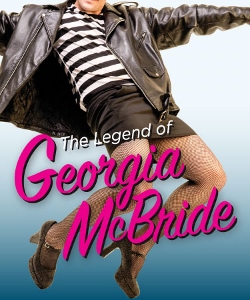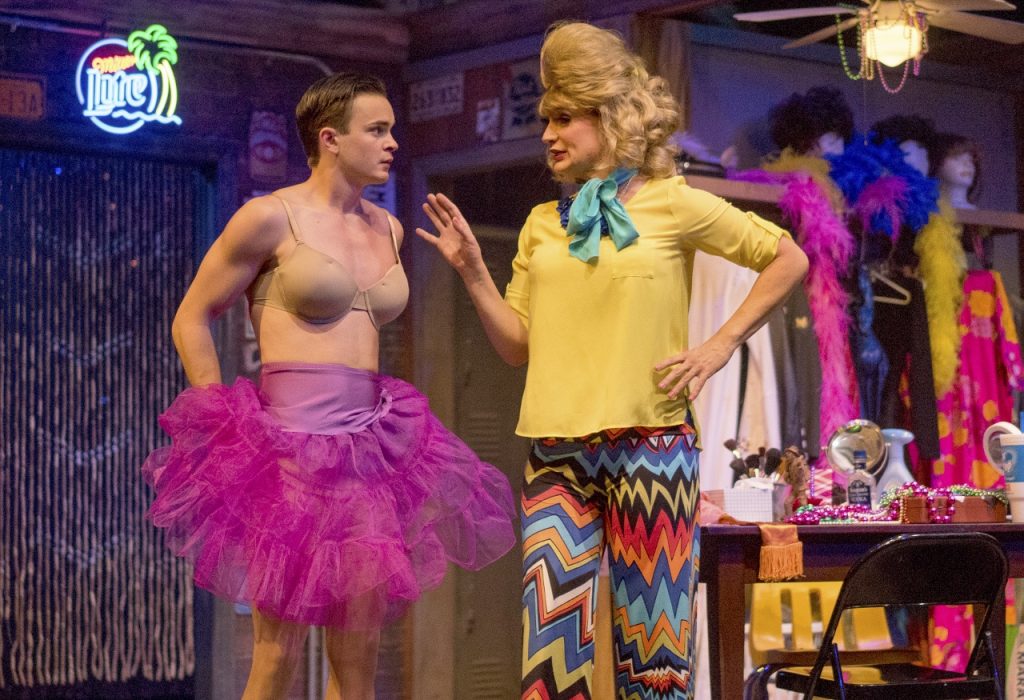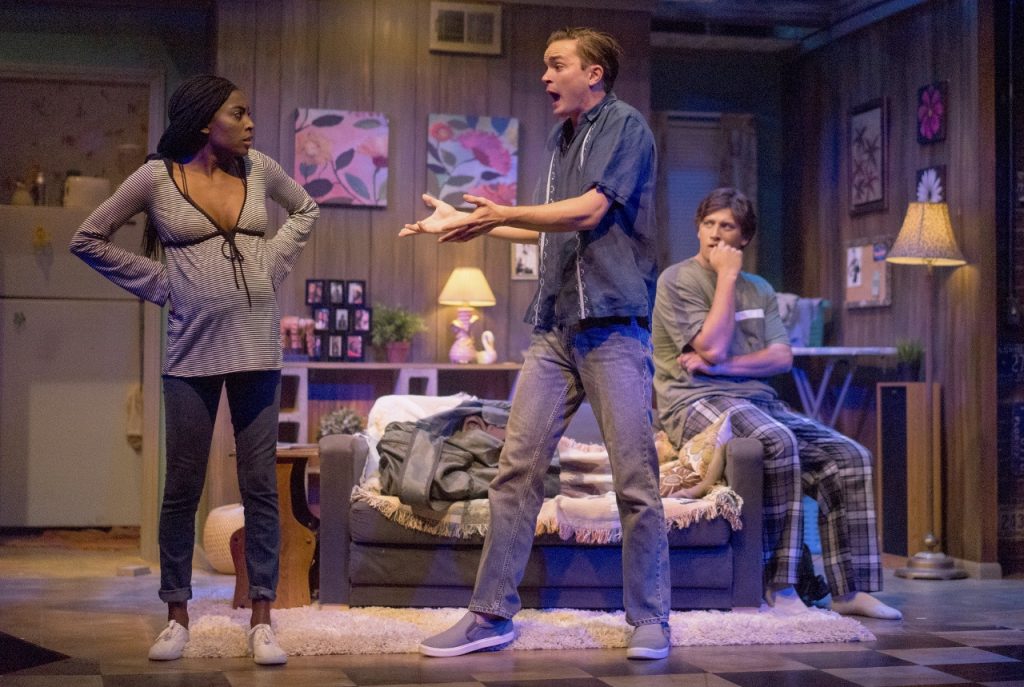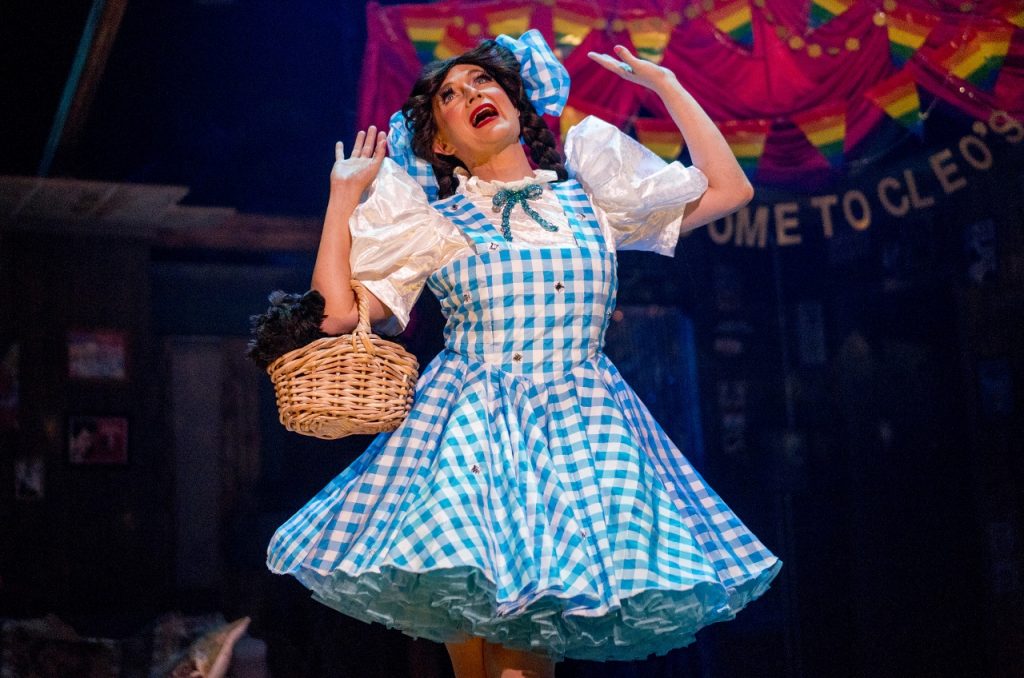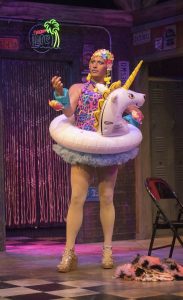GEORGIA MCBRIDE AIN’T NO DRAG
 Playwright Matthew Lopez (The Whipping Man) has created a theatrical recipe: Take one part Torch Song Trilogy, mix in some La Cage aux Folles and, for a fun fish-out-of-water flavor, add in a generous dash of Sister Act. Sprinkle on some mixed nuts and you’re ready to serve up The Legend of Georgia McBride. The result? Delicious.
Playwright Matthew Lopez (The Whipping Man) has created a theatrical recipe: Take one part Torch Song Trilogy, mix in some La Cage aux Folles and, for a fun fish-out-of-water flavor, add in a generous dash of Sister Act. Sprinkle on some mixed nuts and you’re ready to serve up The Legend of Georgia McBride. The result? Delicious.
Casey (Spencer Bang) is a sweet but rather irresponsible man. His sole focus is to make a living as an Elvis impersonator despite the fact that he’s far from great at it and lives in a small city. One night, his more-practical wife Jo (Alexandra Slade) lays out some dire financial needs, including the rent. Casey returns to the club he performs at, optimistic that his star is rising, but instead he is demoted to bartender; bar owner Eddie (Lance Carter) has replaced him with a female impersonator duo—Miss Tracy Mills (David McBean) and Anorexia Nervosa (Chelsey Polk).
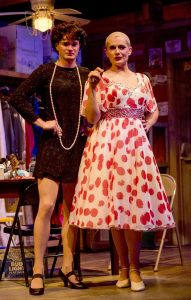 One night, the reckless “Rexy”, as the latter performer is often called, passes out drunk and cannot go on. In desperation, with a packed house waiting, Eddie threatens that all three will be sacked if Casey doesn’t go on in her place. Casey has no interest in drag, nor does he know the song, but the show must go on. The question is, can Casey—literally and emotionally?
One night, the reckless “Rexy”, as the latter performer is often called, passes out drunk and cannot go on. In desperation, with a packed house waiting, Eddie threatens that all three will be sacked if Casey doesn’t go on in her place. Casey has no interest in drag, nor does he know the song, but the show must go on. The question is, can Casey—literally and emotionally?
From there, the script is about half Casey’s story and half drag show (with particularly sharp material for McBean, interweaving songs and lines from multiple movies). The drag performances, like most drag lip-synching, are entertaining if not a display of great musical talent. But, with Jennifer Brawn Gittings’ over- the-top costume offerings and Peter Herman’s wigs and makeup, the “singers” truly close the sale, dazzling us with energy, color and sparkle, including some spectacular headpieces. Many of the best laughs are purely upon one of them entering the stage in a new outfit. Rest assured, though, that plenty of the laughs also come from the one-liners, especially the spicy retorts of Miss Tracy—although we also get to see behind that persona at times.
One thing that sets this program aside from La Cage and Torch Song is that not one character expresses homophobia around the drag theme, making the script feel more contemporary. With that so oft-used source of contention off the table, Lopez’s characters are free to explore deeper themes that drag raises: What does it mean to be a man or woman? What roles do masculinity and femininity serve in today’s society? And how might the expectations around them keep us from being our better selves?
McBride explores the fact that cross-dressing can serve very different interests and needs for those who do it. For some, it is purely a lustful fetish. For others, it’s purely another role option they can play on stage. But for many, it’s a chance to feel closer to a part of oneself that is challenging to tap into while dressed in socially prescribed clothing. The most powerful segment of the show is a monologue by Rexy on what drag means to her. “Drag ain’t a hobby, baby’¦drag is a protest!” Polk’s intense commitment to the fiercely-outspoken drag queen is so strong that many attendees will probably leave unaware that he also plays Casey’s landlord, a gentle, soft-spoken minor character.
The script is a bit predictable, but you’re not likely to care because it isn’t about wondering what will happen; it’s about delighting in the joy with which it is shared. 115 minutes without an intermission is usually pushing it (a growing trend in theater when, once again, an intermission could have worked fine in this show), but the presentation certainly holds attention—and an extremely lively curtain call had patrons dancing at their seats.
The Legend of Georgia McBride
Cygnet Theatre Company
Old Town Theater, 4040 Twiggs St.
Wed & Thurs at 7:30; Fri at 8;
Sat at 3 & 8; Sun at 2 & 7
ends on November 12, 2017
for tickets, call 619-337-1525 or visit Cygnet
